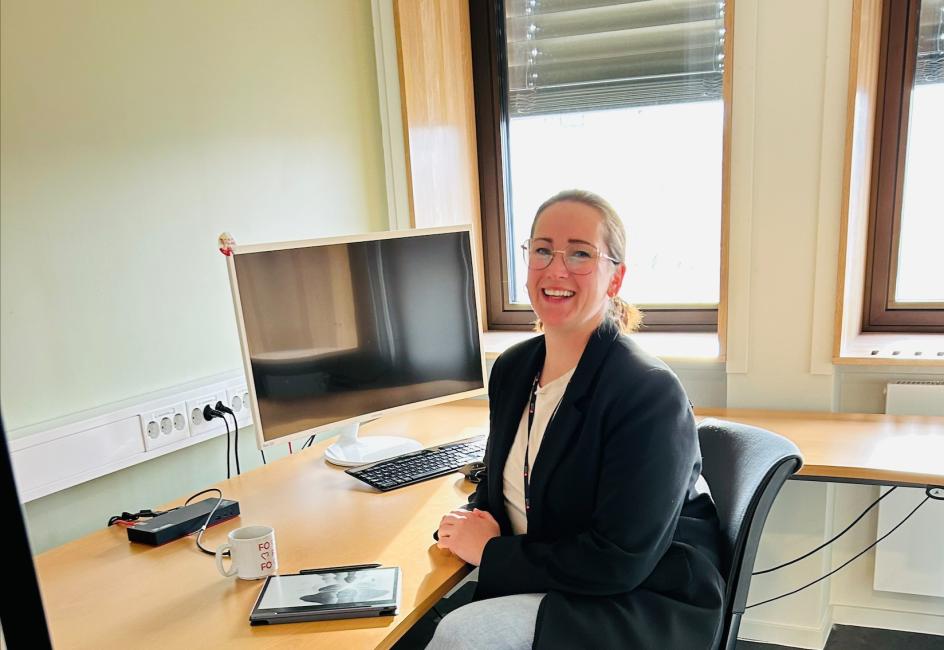
Programme description
Bachelor’s programme in child protection and child welfare educates qualified professionals who can identify needs and provide the right help at the right time to children, young people and families in vulnerable life situations. Through the programme, students obtain special expertise to carry out functions within child welfare services and in other arenas where children and young people in a vulnerable life situation are located. The core competence in the education is related to child welfare research and practice-based knowledge, as well as knowledge from children, young people and their guardians.
Child protection and child welfare work is based on children and young people's life situation and rights and recognises the need of children and young people for security, care, understanding and love. After graduation, students will be able to prevent and uncover neglect and contribute to the provision of adequate services. After graduation, the candidate shall be ethically conscious, reflected and cooperative. Based on the social mandate of child welfare, students will be able to meet children, young people and families in a vulnerable life situation with understanding, empathy and recognition.
The education is also intended to ensure competence and attitudes that form the basis for equal services for all groups in society, including the status of Sami as an indigenous population and their rights to linguistic and culturally adapted services. Integration of theory and practice, academic progression, thorough professional direction and a solid foundation in research are emphasised in the programme which is organised so that students receive training in critical and ethical reflection as well as practical skills. Completed education qualifies for the title of Bachelor in child protection and child welfare.
Career opportunities
Admission to the programme requires Higher Education Entrance Qualifications.
Applicants who do not have Higher Education Entrance Qualifications and are 25 years of age or older may apply for admission on the basis of prior learning and work experience.
A certificate of good conduct is required pursuant to Section 39, first subsection of the Act relating to access to information held in police registers (child welfare certificate).
The fifth semester of the programme is defined as an opportunity for student mobility. Students can exchange to universities abroad, and replace courses for the whole semester.
Students can apply to complete the period of practical training abroad. Students who want to take their practical training abroad in one of the institutions the university has an agreement with can apply for this by 20 June. Applicants must submit a personal application, letter of recommendation and complete a personal interview. Applicants are ranked according to a total assessment of grade results from the first academic year, application, letter of recommendation and interview.
Bachelor’s programme in child protection and child welfare is intended to provide learning outcomes in accordance with the requirements of the Regulations related to the National Guideline for Child Protection and Child Welfare Education Chapters 2 to 5 under the four following areas of competence:
- Child protection and child welfare competence
- Growing up and family life
- Professional role, ethics and cooperation in the child's best interests
- Innovation, critical thinking and knowledge-based supervised professional training
Learning outcome for area of competence 1 - Child protection and child welfare competence
Knowledge
Candidates
a) have broad knowledge of child protection and child welfare’s role in society, partners, distribution of responsibilities and tasks in welfare administration
b) have broad knowledge of applicable Norwegian and international law relevant to the field of child welfare, and relevant legal method, including knowledge of Articles 3,12 and 30 of the United Nations Convention on the Rights of the Child.
c) have knowledge of Sami children's right to grow up in an environment where their ethnic, linguistic and cultural affiliation is emphasised
d) have broad and multidisciplinary knowledge of key child welfare topics, issues and processes
e) have broad knowledge of neglect, abuse and violence; possible causal relationships, expressions and consequences
f) are able to update their organisational theoretical knowledge
g) are able to update their knowledge of child welfare as a subject area
h) have knowledge of various educational methods and measures within environmental therapy and other child welfare work.
Skills
Candidates
a) can apply research knowledge, experience knowledge and knowledge from children, young people and parents as the basis for knowledge-based supervised professional training relating to children, young people and families in their own services, and refer onwards if necessary
b) can apply a broad and multidisciplinary knowledge base to work systematically and purposefully with children
c) can apply a broad and multidisciplinary knowledge base in environmental therapeutic work d) can apply activities to encourage play, learning, inclusion, mastery and participation e) can apply relevant legislation, regulations and guidance.
General competence
Candidates
a) can use knowledge and experience to investigate, facilitate, implement, document, analyse, assess and evaluate child protection and child welfare work in an ethical and professionally sound manner.
Learning outcomes for area of competence 2- growing up and family life
Knowledge
Candidates
a) have broad knowledge of children's adolescence, childhood, socialisation, learning, upbringing and development, with particular understanding of children, young people and families in vulnerable life situations
b) have broad knowledge of family and networking work
c) have broad knowledge of interaction and developmental support care
d) have broad knowledge of substance abuse, mental health, possible problem-creating situations, expressions and consequences
e) have knowledge of indigenous peoples, ethnic minorities and refugees' life situations and rights. The candidates shall also have knowledge of the rights of the Sami, and have knowledge and understanding of their status as indigenous peoples
f) have knowledge of various forms of family life and family policy regulations
g) can update their knowledge of relationships between health, education, work, socioeconomic factors, living conditions, both in respect of individuals and groups in society, in order to contribute to good public health and work inclusion
h) can update their knowledge of health and social policy
i) can update their knowledge of children's digital everyday life.
Skills
Candidates
a) can apply professional knowledge and discretion to advise children, young people, their parents and guardians in learning, coping and change processes
b) can use research, practice and experience-based knowledge to investigate children and young people's care situation and behaviour and facilitate appropriate measures
c) can apply relevant measures that contribute to the inclusion of young disadvantaged people in work
d) can master preventive and health-promoting work in arenas where children and young people spend their time.
General competence
Candidates
a) can plan, implement, document, evaluate and effectuate measures and services based on the child's best interests.
Learning outcomes for area of competence 3 - Professional role, ethics and cooperation in the best interests of the child.
Knowledge
Candidates
a) have broad knowledge of interdisciplinary, inter-agency and inter-professional cooperation
b) have broad knowledge of the assessment and understanding of the best interests of children and the rights of children and families, including the right of Sami children to their own language and culture
c) have broad knowledge of communication, conflict management and cooperation in a society characterised by diversity
d) have knowledge of the structures and professions of the welfare state
e) have knowledge of inclusion, non-discrimination and equality, regardless of gender, ethnicity, religion and beliefs, disability, sexual orientation, gender identity, gender expression and age, so as to contribute to ensuring equal services for all groups in society
f) have knowledge of professional ethics, ethical values, dilemmas and issues in the field of child welfare
g) have knowledge of their own profession and the history of child welfare
h) have knowledge of and can assess the risk of unwanted incidents and have knowledge of methods for following this up systematically.
Skills
Candidates
a) can reflect on power dynamics, professionalism and their own role as a professional in relation to children and families
b) can apply professional knowledge and expertise in initiating and leading interdisciplinary, inter-agency and inter-professional cooperation
c) can apply professional knowledge from children and young people as part of the basis for ensuring the participation and contribution of children and young people
d) can apply professional knowledge to communicate and cooperate appropriately with children, young people and guardians, and can discuss with children topics such as neglect, violence and abuse
e) can use experience and knowledge to build relationships, cooperate and communicate in a way that promotes inclusion, participation and contribution
f) can assess and safeguard the best interests of children and the rights of children and families
g) can apply knowledge-based methods, theories and professional judgment for the benefit of children and families
h) can apply professional knowledge of cultural diversity and show multicultural understanding and cultural sensitivity in the exercise of the service
i) can use experience and professional knowledge to support and guide employees, as well as reflect critically on their own and the service's practices and adjust placement work under supervision.
General competence
Candidates
a) have insight into their own preconceptions, attitudes and values and the importance of interpersonal competence in child welfare work
b) have insight into and are able to deal with ethical issues in the subject area and their own performance of the service
c) have insight into and can safeguard the rights of children, young people and families and help ensure equal services in a society characterised by diversity
d) can use knowledge, skills and experience to meet children, young people and families in a vulnerable life situation with understanding, empathy and appreciation
e) can document and present professional assessments, orally and in writing.
Learning outcomes for area of competence 4 - Innovation, critical thinking and knowledge-based supervised professional training
Knowledge
Candidates
a) have knowledge of scientific theory and how knowledge is developed and understood
b) have knowledge of social science methodology and its possibilities and limitations
c) have knowledge of relevant professional debates, research and development work
d) have knowledge of original thinking and innovation processes
e) have digital expertise, including knowledge of digital security, and be able to assist in the development and use of suitable technology at both the individual and system level
Skills
Candidates
a) can apply professional knowledge to professional development, quality enhancement and service innovation
b) can apply new professional knowledge in a methodical and scientific way
c) can use digital tools and relevant technology.
General competence
Candidates
a) can plan, implement, justify, evaluate and document child welfare work independently and together with others
b) can report on and analyse child welfare work independently and together with others.


